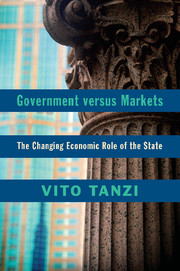Book contents
- Frontmatter
- Contents
- Preface
- PART ONE THE ECONOMIC ROLE OF THE STATE
- PART TWO HISTORICAL REVIEW
- 2 The Role of the State in the Pre–World War II Period
- 3 Forces That Changed the Role of the State
- 4 Growth of Public Spending and Taxation in the 20th Century
- 5 The Role of the State in Social Protection
- 6 Globalization and Public Spending
- PART THREE THEORETICAL AND ANALYTICAL ISSUES
- PART FOUR THE OUTCOME OF STATE INTERVENTION
- PART FIVE ON THE ECONOMIC ROLE OF THE STATE IN THE FUTURE
- Notes
- Index
- References
6 - Globalization and Public Spending
Published online by Cambridge University Press: 07 October 2011
- Frontmatter
- Contents
- Preface
- PART ONE THE ECONOMIC ROLE OF THE STATE
- PART TWO HISTORICAL REVIEW
- 2 The Role of the State in the Pre–World War II Period
- 3 Forces That Changed the Role of the State
- 4 Growth of Public Spending and Taxation in the 20th Century
- 5 The Role of the State in Social Protection
- 6 Globalization and Public Spending
- PART THREE THEORETICAL AND ANALYTICAL ISSUES
- PART FOUR THE OUTCOME OF STATE INTERVENTION
- PART FIVE ON THE ECONOMIC ROLE OF THE STATE IN THE FUTURE
- Notes
- Index
- References
Summary
Introduction
The past two decades have been characterized by a growing attention to a phenomenon that has generally gone under the name of globalization. Many articles and books have been written about this phenomenon, and violent demonstrations have occasionally been organized against international meetings of the World Trade Organization, the IMF, the G7-G8, the G20, or other institutions or organizations to protest the alleged damaging effects of globalization. Some critics of the phenomenon have been asking policy makers to put an end to it. The 2008–9 financial and economic crises, in part closely associated with the globalization of the financial market, brought about sharp falls in international trade. If that crisis had continued, it might have challenged the process of globalization in its recent forms and brought it to an end, as the Great Depression did to the previous period of globalization.
As is often the case with many words in common use, globalization has many faces and many meanings. Consequently, it is not easy to define it precisely, for it means different things to different people. For some it conveys the image of a world that has become a “global village…in which distance and isolation have been dramatically reduced by electronic media.” This definition, provided by Merriam Webster's Collegiate Dictionary (10th edition), points to one aspects of the phenomenon, an aspect that, for sure, is of marginal relevance to a large proportion of the world's population that may not have witnessed yet much genuine reduction in distance and isolation.
- Type
- Chapter
- Information
- Government versus MarketsThe Changing Economic Role of the State, pp. 129 - 148Publisher: Cambridge University PressPrint publication year: 2011



